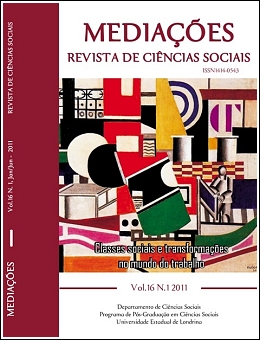Diversidade cultural, pluralidade, diferença: qual é a questão?
DOI:
https://doi.org/10.5433/2176-6665.2011v16n1p275Palavras-chave:
Currículo, Democracia, Diversidades culturais, Foucault, RancièreResumo
O presente artigo busca discutir a presença, na educação brasileira, da questão das diversidades culturais tornadas necessidades curriculares. Para melhor entender essa questão, analisamos sua emergência através de alguns documentos federais - Tema transversal Pluralidade Cultural, nos PCN, As Diretrizes Curriculares Nacionais para a Educação das Relações Étnico-Raciais e para o Ensino de História e Cultura Afro-Brasileira e Africana e o Programa Ética e Cidadania: construindo valores na escola e na sociedade, visando reconhecer as conexões estabelecidas nos citados documentos com as lutas contemporâneas vinculadas ao reconhecimento identitário. Trata-se de traçar um paralelo, mesmo que inicial, entre tais lutas e questões da democracia contemporânea, a partir das noções de desentendimento em Jacques Rancière e de poderes e direitos em Michel Foucault.Downloads
Referências
BRASIL. Ministério da Educação. Resolução nº 1, de 17 de junho de 2004.
Diretrizes curriculares nacionais para a educação das relações étnico-raciais e para o ensino de história e cultura afro-brasileira e africana. Brasília: MEC, 2004.
BRASIL. Secretaria de Educação Básica. Programa ética e cidadania:
construindo valores na escola e na sociedade: relações étnico-raciais e de gênero. Brasília: Ministério da Educação, 2007. (Módulo 1: Ética).
FONSECA, Márcio Alves. Para pensar o público e o privado: Foucault e o tema das partes de governar In: RAGO, Margareth; VEIGA-NETO, Alfredo (org.). Figuras de Foucault. 2. ed. Belo Horizonte: Autêntica, 2008. p. 155-163.
FOUCAULT, Michel. A história da sexualidade I: a vontade de saber. 5. ed. Rio de Janeiro: Graal, 1984.
FOUCAULT, Michel. O sujeito e o poder. In: DREYFUS, H. L.; RABINOW, P. Michel Foucault: uma trajetória filosófica, para além do estruturalismo e da hermenêutica. Rio de Janeiro: Forense Universitária, 1995.
FOUCAULT, Michel. Face aux gouvernements, lês droits de l'homme. In: FOUCAULT, Michel. Dits et écrits II: 1976-1988. Paris: Quarto Gallimard, 2001.
FOUCAULT, Michel. Nascimento da biopolítica: curso dado no collège de France (1978- 1979). São Paulo: Martins Fontes, 2008a. (Coleção Tópicos).
FOUCAULT, Michel. Le Gouvernement de soi et des autres: cours au collège de France 1982-1983. Paris: Gallimard, 2008b.
GIACÓIA JUNIOR, Oswaldo. Sobre direitos humanos na era da bio-política. Kriterion, Belo Horizonte, v. 49, n. 118, p. 267-308, 2008. Disponível em: http://www.scielo.br/scielo.phpscript=sci_arttext&pid=S0100-512X2008000200002. Acesso em: 23 nov. 2009.
NATERCIA, Flávia. Em nome do dissenso, filósofo francês redefine termos e conceitos na arte e na política. Ciência e Cultura, São Paula, v. 57, n. 4, p. 16- 16, 2005. Disponível em: http://cienciaecultura.bvs.br/scielo.php?pid=S000967252005000400011&script=sci_arttext. Acesso em: 17 nov. 2009.
RANCIÈRE, Jacques. O desentendimento: política e filosofia. São Paulo: Ed. 34,1996. (Coleção TRANS).
Downloads
Publicado
Como Citar
Edição
Seção
Licença
Copyright (c) 2011 Daniele Pechuti Kowalewski, Flávia Schilling

Este trabalho está licenciado sob uma licença Creative Commons Attribution 4.0 International License.
Os direitos autorais relativos aos artigos publicados em Mediações são do(a)s autore(a)s; solicita-se aos(às) autore(a)s, em caso de republicação parcial ou total da primeira publicação, a indicação da publicação original no periódico.
Mediações utiliza a licença Creative Commons Attribution 4.0 International, que prevê Acesso Aberto, facultando a qualquer usuário(a) a leitura, o download, a cópia e a disseminação de seu conteúdo, desde que adequadamente referenciado.
As opiniões emitidas pelo(a)s autore(a)s dos artigos são de sua exclusiva responsabilidade.




































